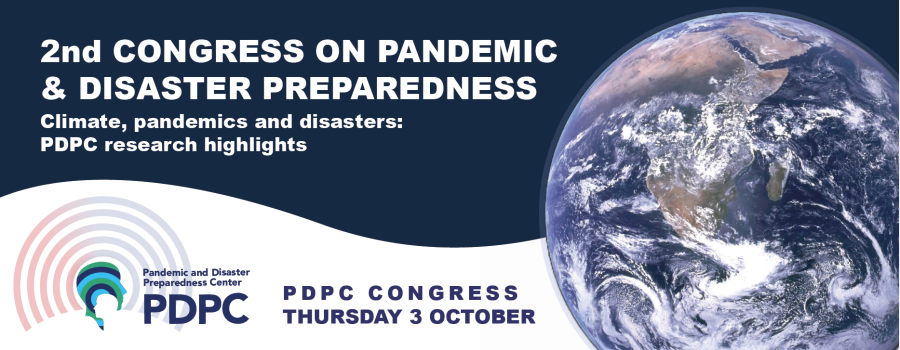Pandemic & Disaster Preparedness Congress

In addition to her role as the coordinator of One Health PACT, Marion Koopmans is also the scientific director of PDPC.
The second Scientific Conference of the Pandemic and Disaster Preparedness Center will be held in Rotterdam, The Netherlands on October 3rd, 2024. The theme of this year’s meeting is “Climate, pandemic and disasters: PDPC research highlights “.
Click here to register for the congress.

Meet these interesting Keynote speakers
- Prof. Marion Koopmans, Scientific director PDPC
- Dr. Anja Schreijer, medical director PDPC
- Prof. Stefan Krause, Professor of Ecohydrology and Biogeochemistry at the School of Geography, Earth and Environmental Sciences, University Birmingham
- Tony Holohan, Director Centre for One Health, University College Dublin
- Jet Bussemaker, Professor in Policy, Science and Societal Impact, especially health, Leiden University
Abstract submission
You are also warmly invited to share your work at the conference’s poster presentation session by submitting an abstract for consideration. Submit your abstraction here.
Abstract submission deadline September 8th, 2024
Notification of selected posters September 15th, 2024
The program
| 09.00 – 09.05 | Welcome and opening congress Geert Maarse, Chairman of the day |
| 09.05 – 09.20 | Introduction PDPC congress Prof. Marion Koopmans, Scientific director PDPC |
| 09.20 – 10.00 | Keynote lecture: Preparedness for Climate change and public health Prof. Stefan Krause, Professor of Ecohydrology and Biogeochemistry at the School of Geography, Earth and Environmental Sciences, University Birmingham |
| 10.00 – 10.30 | Climate change and vector borne virus outbreaks Changes in the weather and adaptions in the landscape – also to address these changes –bring new opportunities for vectors of virus. What does this mean and how to prepare for this? – Dr. Reina Sikkema, Dr. Pier Siebesma and others |
| 10.30 – 11.00 | Coffee Break with Posters |
| 11.00 – 11.30 | Transformational and transdisciplinary research |
| 11.30 – 12.15 | Towards social and urban resilience To improve resilience in an urban environment requires to be familiar with the challenges the population faces and to get a good view on how people deal with these given the socialcontext. Kevin Pijpers and Guusje Enneking will share their experiences with setting up andparticipating in a living lab. Dr. Kevin Pijpers and Guusje Enneking, MA, on Living Lab Rotterdam |
| 12:15 – 13:15 | Lunch break with poster |
| 13.15 – 14.15 | Panel discussion on interdisciplinary advice during pandemics Panel leader: Dr. Anja Schreijer, medical director PDPC Panelmembers: Tony Holohan, Director Centre for One Health, University College Dublin; Dr. Susan van den Hof – Head of the Centre for Infectious Disease Epidemiology and Surveillance at the National Institute of Public Health and the Environment (RIVM); Prof. Jet Bussemaker, Professor in Policy, Science and Societal Impact, especially health, Leiden University |
| 14.15 – 14.45 | Integrated early-warning surveillance methods and tools As most emerging diseases come from animal reservoirs, early warning focusing on detection of changes in the ecology of diseases in wildlife or livestock could potentially prevent outbreaks. Researchers within this research project are on a mission to set up a national surveillance network for pandemics, which will focus on transport hubs. |
| 14.45 – 15.15 | Tea Break – Last chance to vote for the public poster award |
| 15.15 – 16.00 | Predicting measuring and quantifying airborne virus transmission Many mitigation strategies target the modes of virus transmission via direct contact, indirect contact and via large or small droplets. To work on strategies to reduce the spread, we need a greater understanding of the contribution of various routes of transmission of respiratory viruses. Researchers of Erasmus MC and TU Delft work together to get this better insights. |
| 16.00 – 16.45 | Pandemic lessons for flood disaster preparedness Flooding risk cultures – Risk cultures differ between countries and even regions—and they matter for how risks are managed. The ways in which flooding risks are handled are a case in point. In this session we talk about these differences in risk cultures with amongst other Prof Wiebe Bijker, who analyzed differences between Dutch and American dealing with floodings and himself lives in a region that is regularly flooded. Prof., dr., ir. Wiebe Bijker, Professor Emeritus of Technology and Society, Maastricht University, and others. |
| 16.45 – 17.00 | Poster Awards (winners pitch) |
| 17.00 – 18.00 | Drinks |
Click here to register for the congress.